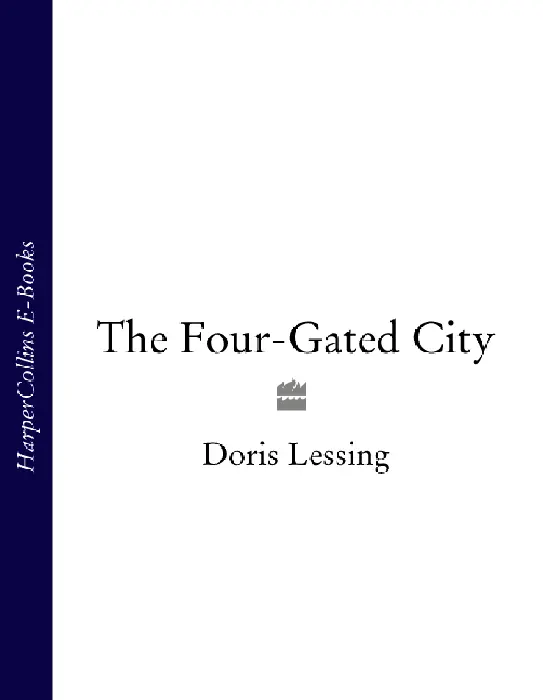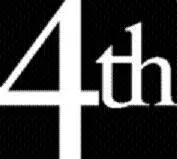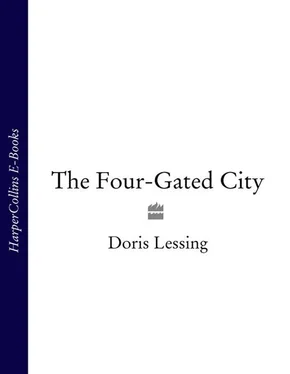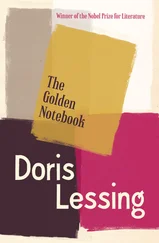
MODERN CLASSIC
The Four-Gated City
Doris Lessing
Book Five of the ‘Children of Violence’ series

Once upon a time there was a fool who was sent to buy flour and salt. He took a dish to carry his purchases.
‘Make sure,’ said the man who sent him, ‘not to mix the two things – I want them separate.’
When the shopkeeper had filled the dish with flour and was measuring out the salt, the fool said: ‘Do not mix it with the flour; here, I will show you where to put it.’
And he inverted the dish, to provide, from its upturned bottom, a surface upon which the salt could be laid.
The flour, of course, fell to the floor.
But the salt was safe.
When the fool got back to the man who had sent him, he said: ‘Here is the salt.’
‘Very well,’ said the other man, ‘but where is the flour?’
‘It should be here,’ said the fool, turning the dish over.
As soon as he did that, the salt fell to the ground, and the flour, of course, was seen to be gone.
A dervish teaching story, from
The Way of the Sufi, by IDRIES SHAH
Cover
Title Page MODERN CLASSIC The Four-Gated City Doris Lessing Book Five of the ‘Children of Violence’ series
Part One Part One In its being and its meaning, this coast represents not merely an uneasy equilibrium of land and water masses; it is eloquent of a continuing change now actually in progress, a change being brought about by the life processes of living things. Perhaps the sense of this comes most clearly to one standing on a bridge between the Keys, looking out over miles of water, dotted with mangrove-covered islands to the horizon. This may seem a dreamy land, steeped in its past. But under the bridge a green mangrove seedling floats, long and slender, one end already beginning to show the development of roots, beginning to reach down through the water, ready to grasp and to root firmly in any muddy shoal that may lie across its path. Over the years the mangroves bridge the water gaps between the islands; they extend the mainland; they create new islands. And the currents that stream under the bridge, carrying the mangrove seedling, are one with the currents that carry plankton to the coral animals building the offshore reef, creating a wall of rocklike solidity, a wall that one day may be added to the mainland. So this coast is built. RACHEL CARSON; The Edge of the Sea
Chapter One
Chapter Two
Chapter Three
Chapter Four
Part Two
Chapter One
Chapter Two
Chapter Three
Chapter Four
Part Three
Chapter One
Chapter Two
Chapter Three
Chapter Four
Part Four
Chapter One
Chapter Two
Chapter Three
Chapter Four
Appendix
Author’s Notes
About the Author
By the same author
Read On
The Grass is Singing
The Golden Notebook
The Good Terrorist
Love, Again
The Fifth Child
Copyright
About the Publisher
In its being and its meaning, this coast represents not merely an uneasy equilibrium of land and water masses; it is eloquent of a continuing change now actually in progress, a change being brought about by the life processes of living things. Perhaps the sense of this comes most clearly to one standing on a bridge between the Keys, looking out over miles of water, dotted with mangrove-covered islands to the horizon. This may seem a dreamy land, steeped in its past. But under the bridge a green mangrove seedling floats, long and slender, one end already beginning to show the development of roots, beginning to reach down through the water, ready to grasp and to root firmly in any muddy shoal that may lie across its path. Over the years the mangroves bridge the water gaps between the islands; they extend the mainland; they create new islands. And the currents that stream under the bridge, carrying the mangrove seedling, are one with the currents that carry plankton to the coral animals building the offshore reef, creating a wall of rocklike solidity, a wall that one day may be added to the mainland. So this coast is built.
RACHEL CARSON; The Edge of the Sea
In front of Martha was grimed glass, its lower part covered with grimed muslin. The open door showed an oblong of browny-grey air swimming with globules of wet. The shop fronts opposite were no particular colour. The lettering on the shops, once black, brown, gold, white, was now shades of dull brown. The lettering on the upper part of the glass of this room said Joe’s Fish and Chips in reverse, and was flaking like stale chocolate.
She sat by a rectangle of pinkish oilcloth where sugar had spilled, and on to it, orange tea, making a gritty smear in which someone had doddled part of a name: Daisy Flet … Her cup was thick whitey-grey, cracked. The teaspoon was a whitish plastic, so much used that the elastic brittleness natural to it had gone into an erosion of hair lines, so that it was like a kind of sponge. When she had drunk half the tea, a smear of grease appeared half-way down the inside of the cup: a thumb mark. How hard had some hand – attached to Iris, to Jimmy? – gripped the cup to leave a smear which even after immersion in strong orange tea was a thumbprint good enough for the police?
Across the room, by another pinkish rectangle, sat Joe’s mother Iris, a small, fattish, smeared woman. She was half asleep, catnapping. She wore an overall washed so often it had gone a greyish yellow. A tired soured smell came from her. The small fattish pale man behind the counter where the tea-urn dominated was not Joe, who had gone off to the war and had never returned home, having married a woman and her café in Birmingham. He was Jimmy, Joe’s mother’s partner. Jimmy wished to marry Iris, but she did not want to marry again. Once was enough she said. Meanwhile they lived together and proposed to continue to live together.
Although both were now ‘resting’, this being a slack time in the café, and had announced, as if they were turning a notice on a door to say CLOSED, that they were resting, both observed Martha. Or rather, their interest, what was alert of it, was focused on what she would do next, but they were too good mannered to let this appear. About an hour before she had asked if she might use the telephone. She had not yet done so. From time to time the two exchanged remarks with each other, as thickly indifferent as words coming out of sleep, sleep-mutters; but yet it was open to Martha to join in if she wished, to comment on weather and the state of Jimmy’s health, neither very good. Today he had a pain in his stomach. Really they wanted to be told, or to find out, why the telephone call was so important that Martha could not make it and be done. The air of the small steamy box which was the café vibrated with interest, tact, curiosity, sympathy – friendship, in short; all the pressures which for a blissful few weeks since Martha had been in England, rather, London, she had been freed from.
Читать дальше














